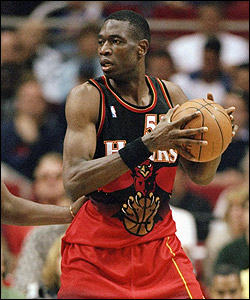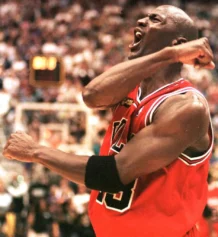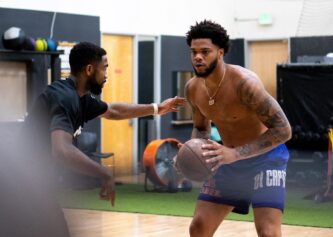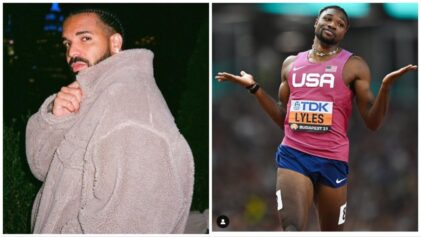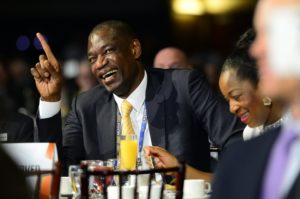
The 7-foot-1 Congo native arguably has done more off the court for his country and Africa than perhaps any athlete has ever done for his native land. That alone should get him in the Hall. How can one not vote for a man who has been so committed to serving others, including in the United States?
Mutombo showed the moment he joined the NBA in 1991 after a stellar career at Georgetown that he was cut from a special and unique cloth. He understood the value of his position and supported his troubled homeland as soon as his significant paychecks started being deposited.
He’s done so much for so long that his basketball career would be considered secondary, except that basketball gave him a global platform and the resources to reach the masses. You’d think he graduated from Georgetown with a degree in humanitarian work instead of the double degrees in linguistics and diplomacy.
In 2007, through his Dikembe Mutombo Foundation, he opened a hospital in Kinshasa—a hospital—called the Biamba Marie Mutombo Hospital. Named after his mother, it is a 170-bed facility that cost $29 million to build. It’s the first new hospital there in 40 years. Futhermore, Mutombo raised money through his rich friends and fellow former Georgetown centers Patrick Ewing and Alonzo Mourning as well as others. He also donated about $8 million of his own money to have it built.
In his deep, hoarse voice with a heavy African accent, Mutombo told the Wall Street Journal that he was pained visiting the Congo and seeing his people suffer.
“I got sick and tired of seeing people dying at a young age,” he said. “It hurt me a lot. People were dying from diseases that were treatable. I thought I could be part of the change and contribute to society and to mankind.”
In 1994, Mutombo, Ewing, Mourning and others from the NBA office took a trip to Johannesburg and Cape Town, South Africa, where they helped build basketball courts and speak to youths about achievement. Mutombo was the most comfortable person in the contingent. The Black South Africans were wowed by his height and connected to him because of his heritage.
“These are my people,” he said back then. “We’re all from Africa.”
Those who did not see Mutombo play in the NBA know him from the Geico commercials, where he blocks people’s attempts to discard things—and then waves his finger (as he did in the NBA) before running out of the scene.
He is second all-time in blocks in NBA history, which is his strongest basketball case to make for the Hall. On the offensive end, Mutombo worked hard but was not a fluid or big scorer. But he was extremely fluid in business and charity.
Here’s some of what he does: He’s active with Hughes Spalding Children’s Hospital Christmas toy drive, Hosea Feed the Hungry and the Atlanta Community Food Bank. For the past 12 years, Mutombo has been one of the leaders of Basketball Without Borders/Africa, the NBA and the International Basketball Federation’s (FIBA) global basketball development and community outreach program that unites young African basketball players from across the continent to promote the sport and encourage positive social change in the areas of education, health and wellness.
He’s been a spokesman for CARE and on the Advisory Board for the Fogarty International Center at the National Institutes of Health. Mutombo has received numerous honors and awards including the 32nd Annual Thurman Munson Award, the Goodermote Humanitarian Award, the President’s Service Award from President Clinton, Big Brothers Big Sisters New York City Achievement in Public Service Award, the Steve Patterson Award for Excellence in Sports Philanthropy, and the John Thompson Jr. Legacy of a Dream Award. Mutombo is a graduate of Leadership Atlanta 2014. And that’s not half of what he does.
Mutombo recently spoke in Atlanta about ending human and sex trafficking in Africa and America.
“It’s not hard, because I love my job,” Mutombo said of being so charity-driven. “I thank the NBA organization for putting the trust in me to carry on this mission of social innovation worldwide. We’re having such a huge impact to our youth with our game of basketball. We invested more than $200 million in social innovation to improve health and literacy.”
He said playing in the NBA has helped him see how important his work is.
“It taught me how to be a good leader, a good competitor and how to win,” he said to the Journal. “It’s not easy to teach a child how to win. I’m glad I had a great mentor. [John Thompson] told me, ‘I know you want to be a doctor, but you can go out to make a lot of money and go out to save lives at the same time.’
“I think it was the right choice, and I don’t regret that I didn’t go to medical school. I can go to medical school today if I want to. What I’ve done now is more than just treating people today—I’ve treated future generations to come.”
Mutombo name might not be called when inductees to the Basketball Hall of Fame are announced in April. But no one who makes it can claim to have done more good for more people than Mutombo.

